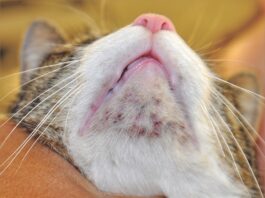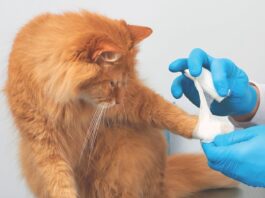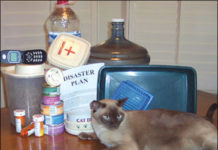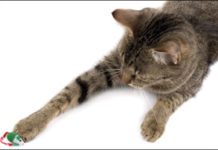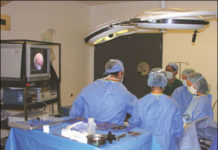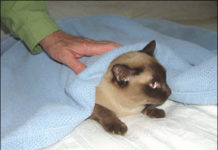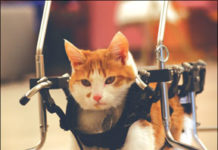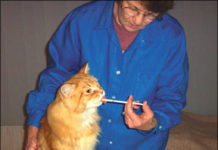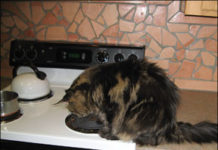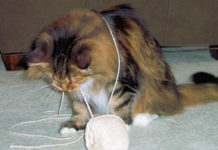Is Your Cat Slowing Down?
At the age of 12, your cat seems to be slowing down a bit, and that could be perfectly normal. After all, a cat of her age - equivalent to the age of 65 or so in a human - has been living a full life and deserves to take it easy on herself. Nevertheless, its a good idea to have the animal checked out by your veterinarian. Its quite possible that her diminished activity is a consequence not of her advancing age but of a debilitating pain in one or more of her joints. Slowed-down, reclusive behavior is an indication of a joint problem in cats of any age, says Christine Bellezza, DVM, a consultant at the Cornell University's College of Veterinary Medicines Feline Health Center. "Some of the signs are very subtle," she points out. "An affected cat may seem lethargic and may increasingly seek out comforting places to nap - in a warm corner of your home, for example, or in a spot of sunshine near a window." The reclusive behavior can also be attributed to a deeply ingrained feline instinct for self-protection. A cat may want to conceal its disability for fear of alerting a potential predator to its vulnerability. Other indications that a cat is suffering pain in one or more of its joints may not be so subtle. "The cat may have trouble hopping in and out of its litter box," says Dr. Bellezza, "and it may avoid going up and down stairs." It is also possible for a cat with a severe joint problem to become constipated because it cant position itself properly to defecate. Furthermore, due to joint pain, an affected cat may be unable to groom itself thoroughly.
Pet Owner Fire Safety Tips
When an out-of-control firestorm raced through the hills above Santa Barbara, California, last fall, frantic residents had little time to grab a few belongings and flee. "My wife and I were able to safely evacuate with our dogs and one of our cats," remembers Jason Bryan, a resident of Montecito, a tiny enclave of Santa Barbara. "Unfortunately, our other cat, Sunny, is adept at hiding, and we couldnt find him before we had to leave. For days, the Bryans lived in a cramped motel room and were forced to wait and wonder whether their house - and beloved cat - had survived the flames. On the fourth day, they were allowed to return to their burned out neighborhood. "Miraculously, our house was still standing," says Marian, Jasons wife. "And best of all, we found Sunny inside, hungry and lonely, but alive. We feel truly blessed." Some were not as fortunate as the Bryans. Sabrina Robinson was just finishing up her workday at a medical supply company when the fire broke out shortly before 6:00 pm on that fateful day. She wasnt aware of the imminent danger until she stepped outside and smelled the acrid smell of smoke.
Help for the Choking Cat
Cats are known to be fastidiously discriminating in their eating behavior. Compared to dogs, they are extremely cautious about what they take into their mouths. Owing to their finicky habits, a cat is unlikely to ingest anything that could cause it to choke. But accidents do happen. A cats environment is full of countless little objects, from sticks, stones and rodent bones - to thimbles, buttons, rubber bands and strands of yarn. If a cat inadvertently takes such a foreign object into its mouth, is not immediately able to disgorge it and attempts to swallow it, the animals upper respiratory apparatus can become blocked and its oxygen supply can become seriously diminished or totally impeded. Oxygen deprivation can cause death within a matter of minutes. Therefore, any signs of choking must be viewed as an emergency situation requiring immediate attention. However, says Gretchen Schoeffler, DVM, chief of emergency and critical care services at the Cornell University Hospital for Animals, veterinarians rarely treat cases of feline choking. This is because such traumatic events tend to be either (1) self-limiting; (2) relieved thanks to prompt action by an affected animals owner; or (3) fatal before veterinary help can be obtained.
Laparascopic Surgery
Your normally active cat isnt eating well, and shes suffering from intermittent vomiting and diarrhea. You make an appointment at the veterinary clinic and during the exam, your veterinarian recommends a liver biopsy to determine exactly whats going on. Sounds simple enough, but taking a biopsy requires that your cat be placed under general anesthesia and her abdomen cut open so the veterinarian can take a small sample of the liver. Afterward, the wound is sutured and your cat must remain in the hospital for a day or two for observation, all the while receiving medication to alleviate her post-operative pain. In the past, this was the typical scenario for all exploratory surgeries in the abdominal region of a cats body. Today, with advances in veterinary medicine, veterinarians have access to a revolutionary surgical technique called laparoscopy - a minimally invasive medical procedure that is being used with increasing frequency for a variety of diagnostic and surgical purposes. The technology is a giant step forward for the veterinary surgical field, according to James Flanders, DVM, an associate professor of surgery at Cornell Universitys College of Veterinary Medicine. "Traditionally, veterinarians would perform an open surgery, where we make a large, mid-line incision in the abdomen in order to look inside and do whatever we need to do, whether its to take a biopsy of the liver or to remove bladder stones. Now, with the laparoscope, we only need to a few small incisions (each one about a half-inch in length). Because the incisions are so tiny, the animal experiences far less post-operative pain and recovers faster."
Broken Bones: A Threat to Indoor and Outdoor Cats
Despite their typically strong, agile, and resilient bodies, cats are subject to a wide variety of musculoskeletal disorders - diseases and injuries affecting the complex structure of bones, muscles, tendons and ligaments that give shape to their bodies and enable them to move about. Fortunately, most of these disorders - such as congenital malformations, inflammatory diseases, and tumorous growths - are relatively rare in cats. Less rare by comparison are bone fractures that result from traumatic events, such as when a cat is hit by a car, for example, or falls from a tree. A fracture can occur when any physical force applies sudden and excessive pressure on a bone until it snaps at its weakest point.
Diagnosis: Feline Anemia
Veterinarians generally recommend that all cats undergo a thorough physical examination at least once a year until they have reached seven or eight years of age, and twice annually thereafter as they progress into their senior years. The exam should include a complete blood count (CBC), a procedure that can reveal or at least suggest the presence of many feline health disorders. The importance of the CBC should not be underestimated. Among other things, a CBC will determine the concentration of red blood cells (erythrocytes) in a drop or two of blood. The procedure will also reveal the density of hemoglobin, an important constituent of each erythrocyte.
Diagnosis: Hypothermia
Cats whose breed developed in frigid areas of the world are likely to tolerate cold weather better than cats whose origins can be traced to more temperate regions. But even the fattest, furriest Maine coon will have only a slight edge over a trim, thin-coated Siamese when it comes to prolonged exposure to the biting winds, ice, snow and sleet that come with winter. Indeed, any cat that is left outside for extended periods of time when the temperature is below freezing-not to mention any poor creature that happens to tumble into an ice-cold pond-will be at risk for a potentially deadly drop in body temperature. The chances that this condition-called hypothermia-will prove fatal depends largely upon the animals age, overall physical condition and ability to regulate its body temperature, says Dr. Gretchen Schoeffler, chief of emergency and critical care services at the Cornell University Hospital for Animals.
Help for Handicapped Cats
For four years, Kathy Barton, a fourth-grade teacher in Velma, Oklahoma, has engaged her class in a worthwhile project involving animals. This past year, she was introduced to a two-year-old male cat named Xavier that had been unable to walk since birth due to an undetermined neurological disorder. Barton knew where to turn for help for this cat, a place she had relied on before for animals like him. Barton contacted HandicappedPets.com, a website offering products, services and support for elderly, disabled and handicapped pets. Bartons class raised $700 to buy Xavier a quad cart - a mobile chair that helps disabled animals to get around.
Is Your Cat Really Hurting?
Pinch your finger in a car door, step on a nail or cut your thumb while peeling an onion, and youre apt to let out a holler that will alert everyone within hearing range to the fact that youre experiencing pain. And then youll spend the next week or two talking about that dreadful moment and its unpleasant consequences. Your cat is much different from you in that respect. Certainly, it can experience discomfort of varying intensity in its hard and soft tissues - its bones, joints, ligaments, muscles and internal organs. And it may howl for a moment when it senses sharp pain. But it certainly wont verbalize. It wont be able to point pathetically to a lacerated paw pad or an aching joint and say, "This is where it hurts!"
The Danger of Burns
Although indoor cats are far less likely than outdoor cats to contract a contagious disease, be ripped up in a brawl with other animals or be struck by a car, they are not completely out of harms way. Even within the confines of their own homes, they can suffer serious injuries, not the least of which are disabling (and even fatal) burns that result from a variety of factors, including their natural curiosity and, all too often, carelessness on the part of their owners. There are three categories of burns: thermal, chemical and electrical.
Ask Dr. Richards: 01/07
Q- I recently lost a three-year-old female cat to heartworm disease. I would like to see more information on what heartworms are, how to treat them, and most importantly, how to prevent these parasites from taking our precious cats. All of my cats are indoors, fixed, and go to the veterinarian yearly.
The Dangers of String
It's a hazard that can put your cat in a serious bind. Here's why.


